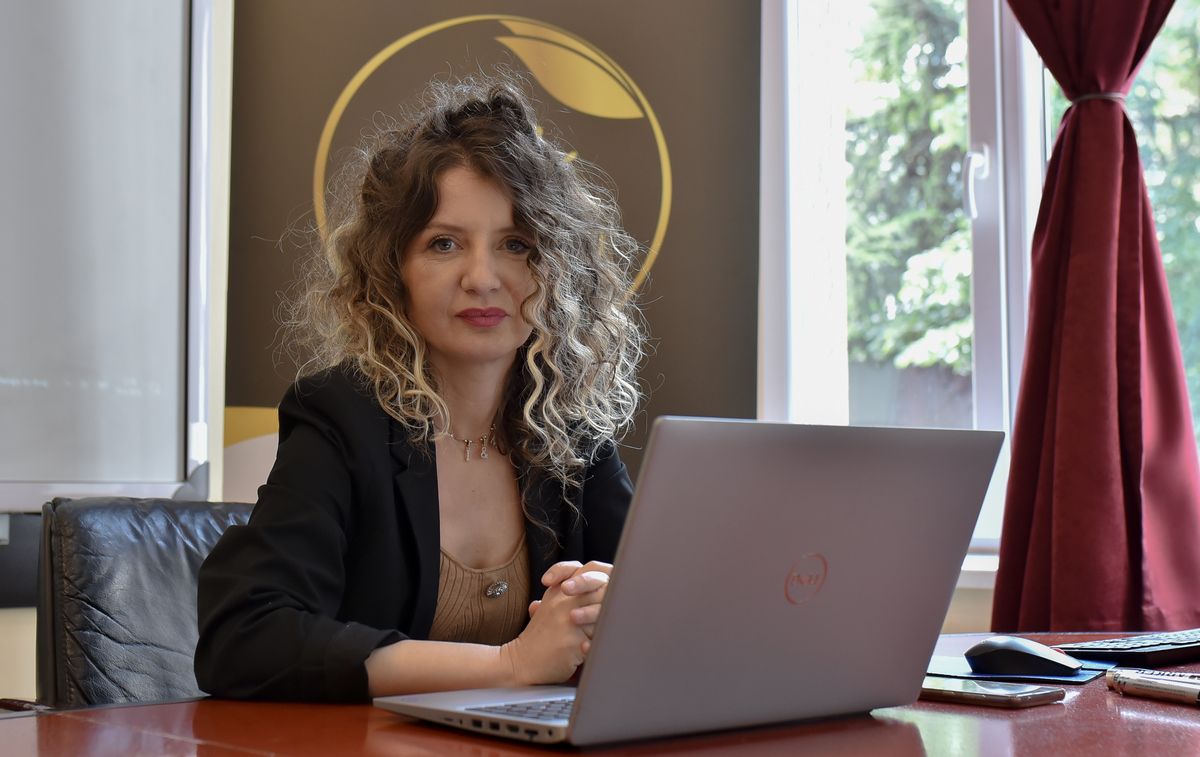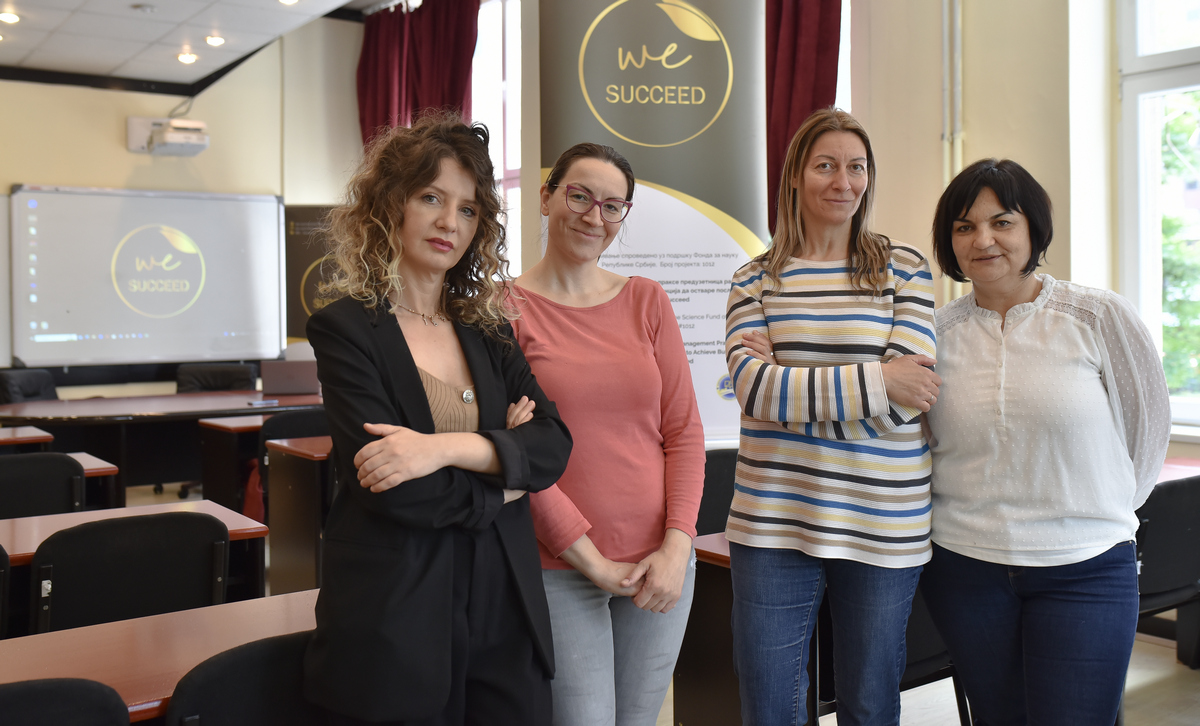Project Title:
Researching Women Entrepreneurs’ Management Practice in Order to Improve Their Competencies to Achieve Business Success
Article Author and Principal Investigator of the Project:
Dr. Danijela Stošić Panić
Associate Professor, Faculty of Economics, University of Niš

The economic empowerment of women and their entrepreneurial activity are important indicators of the development of a certain society. The WE-Succeed project is based on the understanding that the entrepreneurial activity of women can contribute to elevating the quality of life and achieving greater social equality. The WE-Succeed project investigates the effects that management decisions of female entrepreneurs in the manufacturing sector of the Republic of Serbia have on their business performance.
WE-Succeed was conceived as a response to certain challenges that exist in the research of women’s entrepreneurial activity, primarily those related to the following:
- The entrepreneurial activity of women is less pronounced. Consistent with the global situation, the gender gap in entrepreneurial activity exists in the Republic of Serbia. Out of the total number of companies and entrepreneurs in the Republic of Serbia, on average, only 28% have women as owners or founders. In Serbia, gender inequality in entrepreneurship reflects the general gender inequality that is present in the political, economic, and wider social inclusion of women.
- Research on women’s entrepreneurial activity is insufficient or inadequate. Studies of female entrepreneurs often use gender-biased and masculinized criteria and concepts that are imposed on women through research questionnaires. This research practice puts female entrepreneurs in a subordinate position and cannot register potential differences in women’s approach to business. Despite the agreement that qualitative aspects of business performance are important to female entrepreneurs, almost all studies of female entrepreneurs almost exclusively use some financial measure as an indicator of business success. Exclusive reliance on one type of business success indicator does not provide a complete insight into the entrepreneurial activity of women and their performance.
Although with undoubtedly significant economic and social potential, the entrepreneurial activity of women is still insufficiently studied, especially outside of developed countries. Research on female entrepreneurs in the manufacturing sector is even scarcer. Research on female entrepreneurs in Serbia is needed, but they are rare and have methodological shortcomings. Although at the global level, research on women’s entrepreneurial activity is ghettoized because the results are dominantly published in gender-oriented or lower-ranked journals, this is an even bigger problem in developing countries. Studies conducted outside English-speaking countries and the European Union are rare and less likely to be published in top journals.
- Policies and measures to support women’s entrepreneurial activity are not based on empirical records and results of scientific research. Entrepreneurship is recognized in the strategic, institutional and regulatory framework of the Republic of Serbia as a way to improve the economic participation of women and to achieve gender equality. However, the specific position of women is not recognized by mainstream economic policy in Serbia. Gender perspective is not sufficiently included in official economic and entrepreneurial policies and regulations, which do not offer specific forms of support. Gender analyses of entrepreneurship support programmes confirm that there are no targeted and continuous efforts and measures to support the inclusion of women in the growing, innovative, profitable economies of the future, such as the green and circular economy. In the described environment, it should not be surprising that the National Strategy for Gender Equality for the 2021-2030 period emphasizes that measures to improve the entrepreneurial activity of women and their economic empowerment have yielded poor results and have not contributed to closing the gender gap in the economy.
- Insufficient visibility of the research results of scientists from the Republic of Serbia, especially in social sciences. The annual rate of researchers from Serbia producing papers that are published in internationally referenced journals is lower than the average European rate. This is especially pronounced in social sciences and humanities, where only 10% of scientific papers are published in international journals.
- Lack of research results that can be transferred to industry. The scope of university-industry cooperation in research and development in the Republic of Serbia is narrow. The publication of scientific papers is the most common result of the research activity of scientists in Serbia. Although scientific papers signal a certain research potential, the structure of the research results indicates that this potential is not translated into concrete and applicable market solutions.
Responding to the challenges, the project contributes to the accomplishment of several national strategic goals concerning the competitiveness of women’s entrepreneurial activity, gender equality, cooperation between universities and the business sector, elevating the quality and visibility of Serbian science, as well as academic mobility. WE-Succeed is a breakthrough in the research of female entrepreneurs because it considers gender perspective in research design by conducting both qualitative and quantitative research and introducing gender-specific variables, as well as by expanding the set of indicators used to measure business success. The results of WE-Succeed research on a representative sample of female entrepreneurs in the manufacturing sector in the Republic of Serbia will be published in internationally recognized journals and presented at international scientific conferences.
Also, the results of the WE-Succeed scientific research will serve as an empirical basis for devising recommendations for policymakers and support measures for female entrepreneurs, as well as for a practical management guide for female entrepreneurs. Finally, WE-Succeed will produce a ready-to-use business solution as a free mobile application to support female entrepreneurs in managing their businesses. In this way, the Project exceeds the practice of researchers in the Republic of Serbia, which implies that research results are predominantly related to scientific papers, published mostly in national journals.
In the described context, WE-Succeed will add to the knowledge of women’s entrepreneurial activity by identifying its characteristics in less researched environments, such as developing countries and the manufacturing sector; contribute to the consolidation of theories and a complete understanding of the complex phenomenon of entrepreneurship; encourage further research into the entrepreneurial activity of women; inform the adoption of public policies to support female entrepreneurs; boost the competitiveness of female entrepreneurs in the Republic of Serbia, as well as their socio-economic position; improve research and innovation capacity and increase the international visibility of researchers from the Republic of Serbia in the field of social sciences; and will generate business applicable knowledge that will facilitate social and economic development.
Program:
Program IDENTITIES
Project Budget:
EUR 135,496
Scientific and Research Organizations:
Faculty of Economics, University of Niš
Project Team Members:
- Dr. AleksanDr.a Anđelković, Associate Professor, Faculty of Economics, University of Niš
- Dr. Marija Radosavljević, Full Professor, Faculty of Economics, University of Niš
- Dr. Vesna Janković-Milić, Full Professor, Faculty of Economics, University of Niš
- Dr. Bojana Novićević Čečević, Associate Professor, Faculty of Economics, University of Niš
